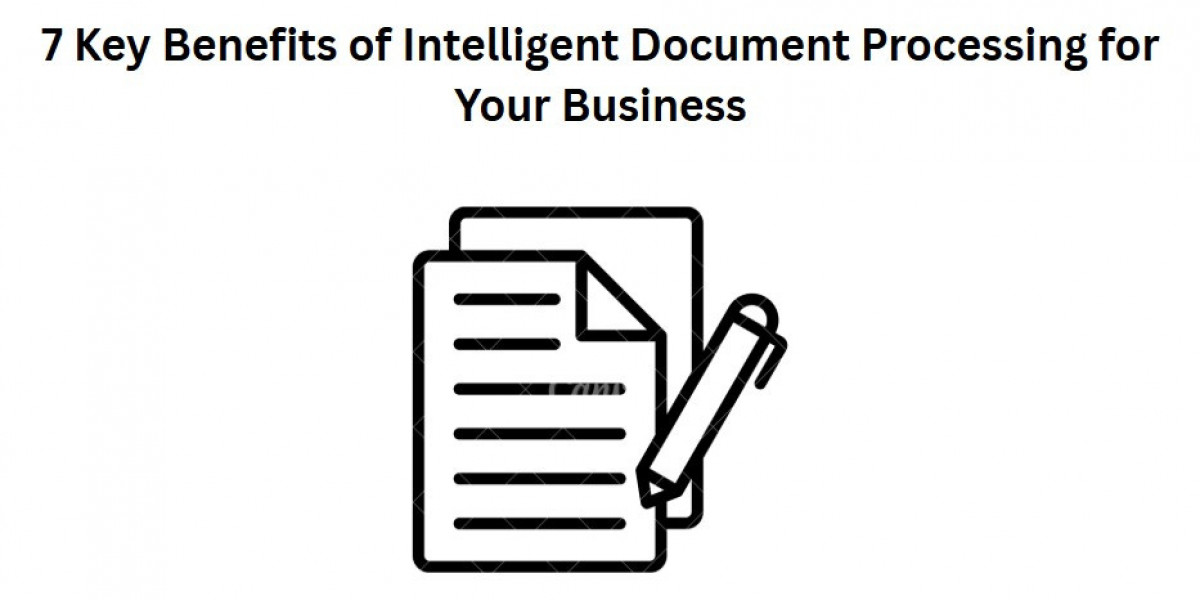In an era where data drives decisions, businesses are drowning in paperwork—invoices, contracts, forms, and reports that require manual processing. Intelligent Document Processing (IDP) is revolutionizing how organizations handle documents by combining Optical Character Recognition (OCR), Artificial Intelligence (AI), and Machine Learning (ML) to automate data extraction and analysis.
At GlobalNodes, we've helped businesses across industries transform their document workflows with our AI-powered Intelligent Document Processing Solution. Here are the 7 key benefits that make IDP a must-have for modern enterprises.
1. Eliminates Manual Data Entry & Reduces Errors
The Problem:
Human data entry is slow (takes 5-10 minutes per document)
Prone to errors (up to 4% error rate in manual entry)
How IDP Helps:
✔ Automates data capture from scanned docs, PDFs, and images
✔ Reduces errors by 90%+ with AI validation
✔ Processes 1000+ documents/hour vs. 50-100 manually
Example: A bank reduced loan processing time from 5 days to 2 hours by automating application form data extraction.
2. Cuts Operational Costs by 50-70%
The Problem:
Manual processing costs
5−
5−15 per document
Requires large administrative teams
How IDP Helps:
✔ Reduces labor costs by automating repetitive tasks
✔ Eliminates paper storage and physical filing
✔ Saves $250,000+ annually for mid-sized companies
Case Study: An insurance firm saved $400K/year by automating claims processing.
3. Accelerates Processing Time by 80%
The Problem:
Invoice approval takes 10-15 days manually
Contract reviews require weeks of human analysis
How IDP Helps:
✔ Processes documents in seconds
✔ Auto-routes approvals based on rules
✔ Reduces cycle times from weeks to hours
Example: A logistics company cut invoice processing from 14 days to 6 hours.
4. Enhances Compliance & Security
The Problem:
Manual handling increases compliance risks
Sensitive data leaks occur with paper trails
How IDP Helps:
✔ Auto-redacts sensitive info (SSNs, bank details)
✔ Maintains audit trails for GDPR/HIPAA compliance
✔ Role-based access control prevents unauthorized viewing
Use Case: A hospital achieved HIPAA compliance by automating patient record processing.
5. Improves Customer & Employee Experience
The Problem:
Slow processing frustrates customers
Employees waste time on mundane tasks
How IDP Helps:
✔ Enables real-time document status tracking
✔ Frees staff for value-added work
✔ Boosts customer satisfaction with faster service
Impact: A telecom company improved customer onboarding NPS by 35 points.
6. Enables Smarter Decision Making
The Problem:
Data trapped in documents isn't actionable
No visibility into process bottlenecks
How IDP Helps:
✔ Converts documents into structured data
✔ Provides analytics on processing metrics
✔ Identifies optimization opportunities
Example: A retailer used invoice analytics to negotiate better supplier terms.
7. Scales Effortlessly with Business Growth
The Problem:
Manual processes can't handle volume spikes
Hiring/training staff is expensive and slow
How IDP Helps:
✔ Processes 10x volume without added staff
✔ Cloud-based solutions scale on demand
✔ Adapts to new document types via AI learning
Industry-Specific Benefits of Intelligent Document Processing
Intelligent Document Processing (IDP) is transforming operations across industries by automating data-heavy workflows. While the core benefits of efficiency, accuracy, and cost savings apply universally, each sector gains unique advantages tailored to its specific document challenges. Here's how IDP delivers targeted value across key industries:
1. Banking & Financial Services
Loan Processing: Automates extraction of applicant data from pay stubs, tax forms, and bank statements, reducing approval times from days to hours
KYC Compliance: Rapidly verifies customer identities by processing IDs, utility bills, and signatures with fraud detection
Trade Finance: Digitizes letters of credit and bills of lading, enabling real-time transaction tracking
2. Healthcare & Pharmaceuticals
Patient Onboarding: Automates intake forms and insurance verification, cutting administrative burdens by 60%
Claims Processing: Extracts data from complex medical bills and EOBs with 95%+ accuracy
Clinical Trials: Processes case report forms and consent documents at scale for faster research cycles
3. Insurance
Claims Automation: Reads damage estimates, police reports, and medical records to accelerate settlements
Underwriting: Analyzes risk documents (inspections, financial statements) for smarter policy decisions
Fraud Prevention: Flags altered documents and suspicious patterns across claims history
4. Legal & Compliance
Contract Lifecycle Management: Extracts clauses, dates, and obligations from thousands of pages in minutes
Discovery Process: Identifies key terms and patterns across litigation documents
Regulatory Compliance: Automates retention policies and audit trails for sensitive records
5. Retail & E-Commerce
Purchase Order Processing: Automates matching of POs, invoices, and packing slips for 3-way matching
Vendor Management: Digitizes supplier contracts and tracks performance metrics
Returns Processing: Reads return labels and authorization forms to streamline refunds
6. Manufacturing & Logistics
Bill of Lading Processing: Extracts shipment details, weights, and destination data automatically
Quality Control: Digitizes inspection reports and equipment logs for predictive maintenance
Inventory Management: Processes supplier invoices and stock reports in real time
7. Government & Public Sector
Citizen Services: Automates processing of permits, licenses, and benefit applications
Records Management: Digitizes decades of paper archives for easy retrieval
FOIA Requests: Quickly redacts sensitive information from released documents
8. Energy & Utilities
Field Reports: Processes handwritten technician notes and equipment readings
Regulatory Filings: Automates extraction of compliance data from complex reports
Smart Metering: Digitizes consumption data from varied statement formats
9. Education
Admissions Processing: Automates extraction of student records and application materials
Research Administration: Processes grant proposals and compliance documentation
Transcript Services: Digitizes decades of academic records for instant verification
10. Real Estate
Lease Abstraction: Extracts key terms from commercial leases for portfolio analysis
Closing Documents: Automates processing of titles, deeds, and settlement statements
Property Management: Digitizes maintenance requests and inspection reports
Each implementation delivers industry-specific ROI:
Banks see 40% faster loan processing
Hospitals reduce claims denial rates by 35%
Manufacturers achieve 98% invoice matching accuracy
Government agencies cut citizen wait times by 75%
The common thread? IDP transforms industry-specific document pain points into competitive advantages through intelligent automation. Whether you're drowning in patient records, contracts, or shipping manifests, there's a tailored IDP solution to streamline your workflows.
Conclusion: Embrace the Future of Document Processing with Intelligent Automation
In today’s fast-moving digital landscape, businesses can no longer afford to rely on slow, error-prone manual document processing. Intelligent Document Processing (IDP) is transforming operations across industries by delivering unmatched efficiency, accuracy, and cost savings. From eliminating tedious data entry to enhancing compliance and enabling data-driven decisions, IDP empowers organizations to work smarter—not harder.
By adopting an AI-powered Intelligent Document Processing Solution, your business can:
✔ Slash operational costs by up to 70%
✔ Boost productivity with 80% faster processing
✔ Minimize risks through automated compliance and fraud detection
✔ Scale seamlessly to handle growing document volumes
The question isn’t whether you should implement IDP—it’s how soon you can start reaping its benefits. Whether you're in finance, healthcare, logistics, or legal services, the right IDP solution can future-proof your operations and give you a competitive edge.









